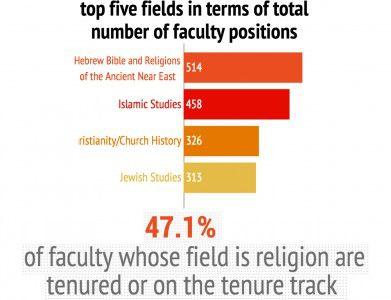
Students majoring in religious studies at institutions of higher education such as Boston University will likely face more job prospects than they would have in the early 2000s upon graduating, according to a recent report.
The report, conducted by researchers from the Society of Biblical Literature and the American Academy of Religion, established that the religion job market is significantly more stable now than it was in 2008.
“The study shows that the number of positions in 2011 significantly increased from 2010 but plateaued in 2012 at 2002-2004 levels,” said SBL Executive Director John Kutsko. “The typical position is a full-time tenure-track appointment at a U.S. private not-for-profit institution in a traditional field of study such as New Testament or theology with a yearly course load of four to six.”
Researchers used data from job openings posted with SBL and AAR in order to produce the report, Kutsko said. These numbers do not necessarily reflect the total amount of job openings in academic fields.
From 2001 to 2012, the greatest number of positions were available in the fields of New Testament, Christian Origins, Ancient Christianity, Hebrew Bible and Religions of the Ancient Near East, Islamic Studies, History of Christianity and Church History and Jewish Studies, the report stated.
The results of the report indicate that students studying within the field of religion should attend graduate school, Kutsko said.
“The report focuses almost exclusively on academic employment, since this is the nature of the vast majority of positions that are advertised with us,” he said. “The data show that hiring institutions require a doctoral degree almost across the board, which means that undergraduates looking to this report for guidance will have to pursue further study.”
Frank Korom, a professor of religion and anthropology, said there is plenty of room for religion majors in the working world.
“The market is stable for religion majors because there are a lot of religion departments out there that need good teachers,” Korom said, “As long as students keep taking religion classes, there will always be a need for people to teach them.”
Professor of history and religion Deeana Klepper said the large number of students pursuing graduate degrees in religious studies puts students in religious fields in a similar position to student studying the humanities.
“There are more people pursuing doctorates than there are full time teaching positions,” she said. “In that regard, religion is in much the same place other humanities disciplines are. But there are certainly many people being hired every year, and that obviously has to do with undergraduate interest in religious studies and the need to staff those classrooms.”
Graduates with religious studies degrees have the option of entering multiple fields once they graduate, Klepper said.
“Most religion majors go on to do other things that engage their knowledge of diverse religious cultures without specifically working in the field,” she said. “They work in a range of nonprofit organizations dedicated to humanitarian causes, they become lawyers, they work in education, they go on to medical school, et cetera.”
College of Arts and Sciences senior Abigail Clauhs, a religious studies major and president of BU’s Interfaith Council, said the stability of the job market for religion majors depends on what students want to do with their degrees after graduation.
“One of the beautiful things about a degree in religion is that you can go many directions with it,” she said. “… There are quite a lot of possibilities, so it is difficult to talk about job stability. I will say that as the world becomes increasingly more globalized and connected, and as this leads to more people of different religions encountering each other, religious knowledge is an important tool to have.”
This is an account occasionally used by the Daily Free Press editors to post archived posts from previous iterations of the site or otherwise for special circumstance publications. See authorship info on the byline at the top of the page.



